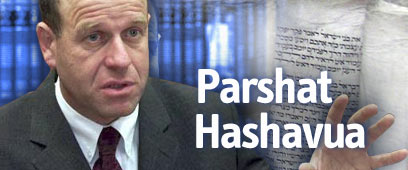
All of the weekly Torah portions are read on the Sabbath, except this one. The portion which marks the end of annual Torah cycle is always read out on the holiday we know as Simhat Torah.
And this holiday, as others, doesn't always fall on the Sabbath. And since the main emphasis of this day is on the circle of reading – with the reading of the last portion from the book of Deuteronomy, immediately followed by the start of Genesis, the content is largely ignored. This, therefore, is the time to analyze the texts.
A comparison must be made between the words of Moses and Jacob, who lies on a bed of pain in Egypt, and who calls his sons in order to tell them what the future holds.
'He did not know the father of the tribes'
Jacob summarized the frustrations of his life. He reminded his son Reuben of the discovery that he had slept with Jacob's second wife, Bilhah. He did not forgive Shimon and Levi for their crimes and violence. Thus, from son to son, he gives his blessing, and prophesizes what he makes of their future based on their individual character, of each son who stands before him.
Moses sees things differently. He did not know the father of the tribes. He came to know their many offspring only in his later life. In any case, he was not a captive of the personal image of Reuben, or Levi, Benjamin, or the rest of the mythological characters, who made our past what it was.
In front him, he sees a mass of people, tribes, and tents. He understands that there is no place for tribal separatism and generalizations. And it could be that he doesn't even know any real differences between the sons of one tribe or another, because his blessing is much more tender, and placated. It's very different from the tensions and disputes which he had experienced for the last forty years.
Despite this, it's interesting to make a comparison between the political realities which lie behind the blessings of the two "elders." Jacob saw against his own eyes three sons who had the potential to engage in conflict and war for the crown of leadership over the future nation: Reuben attacked his biological father, Judah has natural leadership qualities, and Joseph's place as his father's favorite, and son of the proffered mother, Rachel. It's not a coincidence that these three star in the story of the selling of Joseph into slavery, a story that forms the peak of the family power struggle.
Moses sees a different reality. He simply doesn't pay attention to Reuben, when he tells tersely tells the tribe: "May Reuben live and not die, though few be his numbers."
Actually, Moses is hinting, without much sensitivity, to the problem of Reuben: The leader of this tribe was the friend of Korah, who rebelled against Moses and God during the wonderings in the desert. Therefore, when the ground swallowed up Korah, it also swallowed the problem of the Reubenites' claim to leadership.
The sons of Judah, who see themselves as the children and inheritors of the indisputable leader, and the sons of Joseph, who inherit the legacy of the deputy to the king of Egypt, are left. Joseph was the most experienced of the brothers, and he left behind princes and grandchildren elevated above the rest of the nation. They grew up in a palace as Moses himself had done.
The distant future
Moses did not know what the future would hold. Would the kingdoms of Joseph be the ones to lead the nation? And of what Judah? Moses recognizes power and fighting ability in both. He blesses Judah: "Hear, O Lord the voice of Judah and restore him to his people. Though his own hands strive for him, help him against his foes."
Joseph is blessed "with the bounty of earth and its fullness, and the favor of the Presence in the Bush."
Apparently, Moses leaves his will unsolved. But a deeper understanding of his words and blessings show who he really prefers.
Moses prefers Joseph, and the tens of thousands of members of Ephraim, and the thousands of sons of Menashe, over Judah.
For if this was not the case, why would he, in turning to God to bless Judah, as is customary in blessings, turn to the standard title of the recipient of his prayer, Jehovah, compared to his blessing of Joseph, in which he uses the title: "Lord be his land" to refer to God? Was this not the first and original God Who revealed Himself to Moses the sheep shepherd through the burning bush.
Moses' identification with Joseph is understandable and natural. They both came from the same palace. They both saw the world, and both of them grew up in the shadows of kings. Both survived the wickedness of the sons of Israel, the others, the doubters.
And therefore Moses blesses the sons of Joseph with the blessing of his private God, the God of the burning bush.
Moses may have seen, from his last day, the distant future.
Days in which the sons of Aharon would stick to the Temple of Judah in Jerusalem, and in which the offspring of Levi – including his own grandchildren – would establish the kingdom of Joseph in the north of Israel. Who knows. Maybe, if we read the Torah again next year, we will learn something new.
















